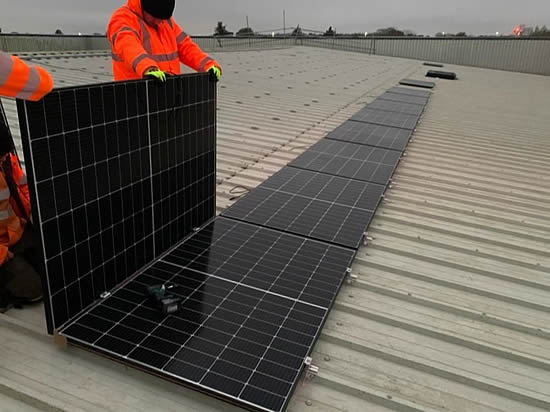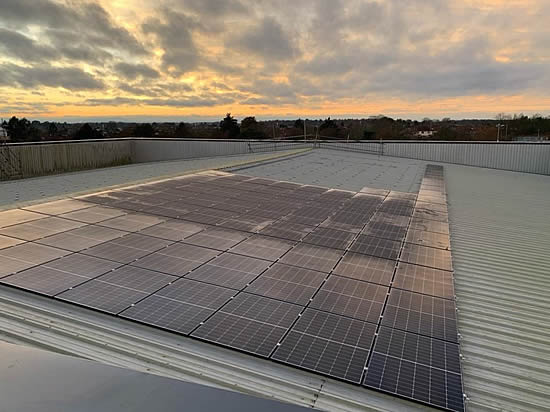Norwich, UKSaxon Air power boosts their sustainability strategy with RenEnergy |
Saxon Air has made further strides towards their ambitious sustainability strategy by having a grid-connected solar PV solution installed by Norwich-based RenEnergy.
The system was switched recently and is already turning sunlight into clean, green energy. In addition, an exciting solar plane port is being planned.
Saxon Air Charter Ltd is already a carbon-neutral company, and in 2019,they launched an extensive sustainability strategy. Their goal is to achieve net-zero carbon emissions by 2030 through a combination of reduction efforts and business process changes. Saxon Air offers a range of integrated aircraft services, including discreet point-to-point transfers by helicopter and business jet to a range of destinations in the UK, Europe and worldwide.
Beyond charter flights, Saxon Air’s core services include running two flight support operations at Norwich Airports well as aircraft management. Utilising solar PV energy and establishing a charging infrastructure that enables fast charging for electric aircraft are components of their sustainability strategy. Installing a solar PV solution also reduces the cost of electricity imported from the grid.
RenEnergy was founded in Norwich in 2006 and has developed extensive experience and expertise in engineering renewable energy solutions, with innovative solutions in roof and ground arrays, solar carport and the electric vehicle charging space. RenEnergy is principally focused on the application of solar photovoltaics (PV) and energy storage. The company consults on, designs and delivers innovative renewable solar PV solutions to clients around the world.

Each solar project is unique and many projects will have special considerations. Choosing a reputable, experienced partner such as RenEnergy is critical to the success of renewable energy projects. RenEnergy has engineered solutions for various environments and have navigated many factors such as planning permissions, varying roof pitches, environmental impact, industrial building characteristics and many more.
On this project, special considerations included some technical factors related to the addition of a future plane port, and importantly, the impact of working within an airport environment. For the safety of the installer crew, noise levels had to be considered, as aircraft, and in particular helicopters, land and take off frequently.

The management of Foreign Object Debris (FOD) was critical. All installation equipment and component packaging had to be meticulously managed to ensure that all potential FOD was captured. Any FOD identified on site would immediately halt works, and FOD also has the potential to damage live aircraft. Challenging roof pitches, insulated roof panels and parapets were successfully navigated within limited space, and all lifting and transport arrangements had to be cleared by both Saxon Air and Norwich Airport.
Facts about the solution
- System size: 313kWp
- Number of solar panels:764
- Generation surface:1,492m2
- Number of inverters: 12
- Energy generated: 263,639kWh/year, of which approximately half will be used by SaxonAir and the other half will be exported to the grid
- CO2 emissions avoided: 50,065kg/year - equivalent to 2,500 trees growing for a year.
Saxon Air’s aircraft fleet includes an electric plane and a solution to sustainably charge the aircraft will be provided by RenEnergy. A solar plane port will not only generate a renewable source of electricity, it will also act as a covered parking space for the electric plane.
Damian Baker, RenEnergyMD: “We are so thrilled to play a part in Saxon Air’s sustainability journey. Working with a client that is so clear on their objectives and that is willing to innovate beyond the obvious, aligns perfectly with our ethos. We can’t wait to install the plane port next!”
SaxonAir Group Operations Director, John Dewing: “I would like to thank you and the team for delivering this project with very few issues. The guys on site have been brilliant and a pleasure to work with.”

BlueSky Business Aviation News | 22nd February 2024 | Issue #736




